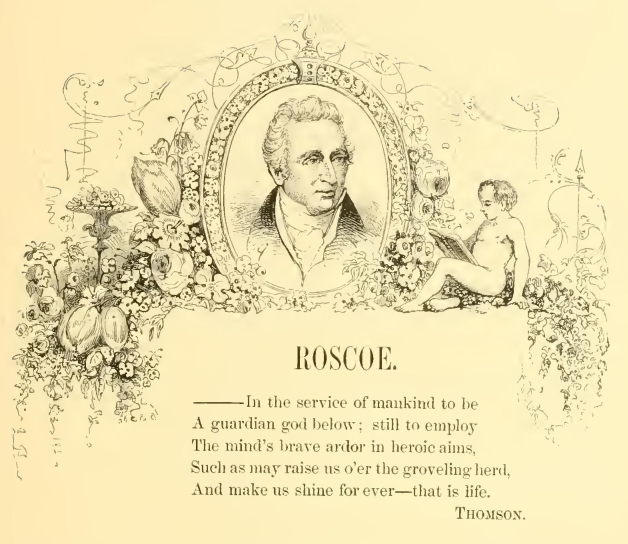From "Roscoe," an essay found in The Sketchbook of Geoffrey Crayon, Esq., by Washington Irving
While my feelings were yet alive on the subject, it was my fortune to light on further traces of Mr. Roscoe. I was riding out with a gentleman, to view the environs of Liverpool, when he turned off, through a gate, into some ornamented grounds. After riding a short distance, we came to a spacious mansion of freestone, built in the Grecian style. It was not in the purest style, yet it had an air of elegance, and the situation was delightful. A fine lawn sloped away from it, studded with clumps of trees, so disposed as to break a soft fertile country into a variety of landscapes. The Mersey was seen winding a broad quiet sheet of water through an expanse of green meadow land, while the Welsh mountains, blended with clouds, and melting into distance, bordered the horizon.This was Roscoe’s favorite residence during the days of his prosperity. It had been the seat of elegant hospitality and literary retirement. The house was now silent and deserted. I saw the windows of the study, which looked out upon the soft scenery I have mentioned. The windows were closed—the library was gone. Two or three ill-favored beings were loitering about the place, whom my fancy pictured into retainers of the law. It was like visiting some classic fountain, that had once welled its pure waters in a sacred shade, but finding it dry and dusty, with the lizard and the toad brooding over the shattered marbles.I inquired after the fate of Mr. Roscoe’s library, which had consisted of scarce and foreign books, from many of which he had drawn the materials for his Italian histories. It had passed under the hammer of the auctioneer, and was dispersed about the country. The good people of the vicinity thronged liked wreckers to get some part of the noble vessel that had been driven on shore. Did such a scene admit of ludicrous associations, we might imagine something whimsical in this strange irruption in the regions of learning. Pigmies rummaging the armory of a giant, and contending for the possession of weapons which they could not wield. We might picture to ourselves some knot of speculators, debating with calculating brow over the quaint binding and illuminated margin of an obsolete author; of the air of intense, but baffled sagacity, with which some successful purchaser attempted to dive into the black-letter bargain he had secured.

















































































































































No comments:
Post a Comment